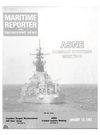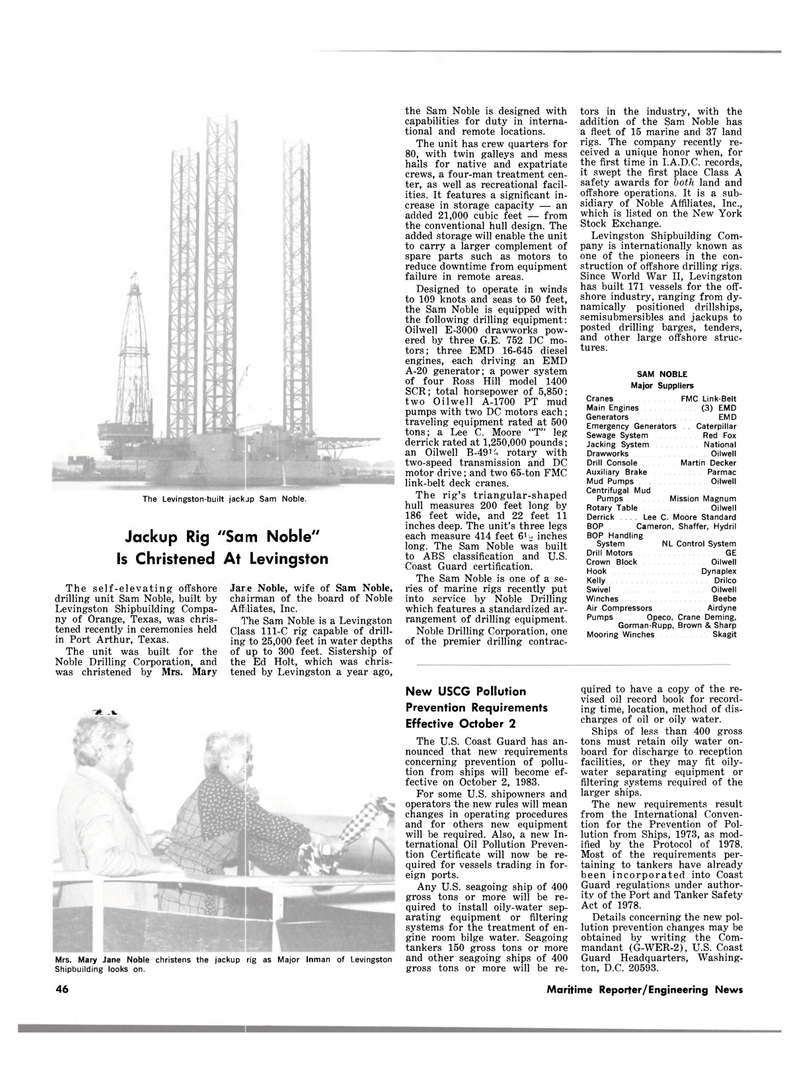
Page 42: of Maritime Reporter Magazine (January 15, 1983)
Read this page in Pdf, Flash or Html5 edition of January 15, 1983 Maritime Reporter Magazine
The Levingston-built jackjp Sam Noble.
Jackup Rig "Sam Noble"
Is Christened At Levingston
The self-elevating offshore drilling unit Sam Noble, built by
Levingston Shipbuilding Compa- ny of Orange, Texas, was chris- tened recently in ceremonies held in Port Arthur, Texas.
The unit was built for the
Noble Drilling Corporation, and was christened by Mrs. Mary safe jm.
Jane Noble, wife of Sam Noble, chairman of the board of Noble
Affiliates, Inc.
The Sam Noble is a Levingston
Class 111-C rig capable of drill- ing to 25,000 feet in water depths of up to 300 feet. Sistership of the Ed Holt, which was chris- tened by Levingston a year ago, the Sam Noble is designed with capabilities for duty in interna- tional and remote locations.
The unit has crew quarters for 80, with twin galleys and mess halls for native and expatriate crews, a four-man treatment cen- ter, as well as recreational facil- ities. It features a significant in- crease in storage capacity — an added 21,000 cubic feet — from the conventional hull design. The added storage will enable the unit to carry a larger complement of spare parts such as motors to reduce downtime from equipment failure in remote areas.
Designed to operate in winds to 109 knots and seas to 50 feet, the Sam Noble is equipped with the following drilling equipment:
Oilwell E-3000 drawworks pow- ered by three G.E. 752 DC mo- tors; three EMD 16-645 diesel engines, each driving an EMD
A-20 generator; a power system of four Ross Hill model 1400
SCR ; total horsepower of 5,850 : two Oilwell A-1700 PT mud pumps with two DC motors each; traveling equipment rated at 500 tons; a Lee C. Moore "T" leg derrick rated at 1,250,000 pounds; an Oilwell B-49lxo rotary with two-speed transmission and DC motor drive; and two 65-ton FMC link-belt deck cranes.
The rig's triangular-shaped hull measures 200 feet long by 186 feet wide, and 22 feet 11 inches deep. The unit's three legs each measure 414 feet 61 L> inches long. The Sam Noble was built to ABS classification and U.S.
Coast Guard certification.
The Sam Noble is one of a se- ries of marine rigs recently put into service by Noble Drilling which features a standardized ar- rangement of drilling equipment.
Noble Drilling Corporation, one of the premier drilling contrac- tors in the industry, with the addition of the Sam Noble has a fleet of 15 marine and 37 land rigs. The company recently re- ceived a unique honor when, for the first time in I.A.D.C. records, it swept the first place Class A safety awards for both land and offshore operations. It is a sub- sidiary of Noble Affiliates, Inc., which is listed on the New York
Stock Exchange.
Levingston Shipbuilding Com- pany is internationally known as one of the pioneers in the con- struction of offshore drilling rigs.
Since World War II, Levingston has built 171 vessels for the off- shore industry, ranging from dy- namically positioned drillships, semisubmersibles and jackups to posted drilling barges, tenders, and other large offshore struc- tures.
SAM NOBLE
Major Suppliers
Cranes FMC Link-Belt
Main Engines (3) EMD
Generators EM
Emergency Generators Caterpillar
Sewage System Red Fox
Jacking System National
Drawworks Oilwel
Drill Console Martin Decker
Auxiliary Brake Parmac
Mud Pumps Oilwell
Centrifugal Mud
Pumps Mission Magnum
Rotary Table Oilwell
Derrick . . . . Lee C. Moore Standard
BOP Cameron, Shaffer, Hydril
BOP Handling
System NL Control System
Drill Motors GE
Crown Block Oilwell
Hook Dynaplex
Kelly Drilco
Swivel Oilwell
Winches Beebe
Air Compressors Airdyn
Pumps . Opeco, Crane Deming,
Gorman-Rupp, Brown & Sharp
Mooring Winches Skagit
Mrs. Mary Jane Noble christens the jackup rig as Major Inman of Levingston
Shipbuilding looks on.
New USCG Pollution
Prevention Requirements
Effective October 2
The U.S. Coast Guard has an- nounced that new requirements concerning prevention of pollu- tion from ships will become ef- fective on October 2, 1983.
For some U.S. shipowners and operators the new rules will mean changes in operating procedures and for others new equipment will be required. Also, a new In- ternational Oil Pollution Preven- tion Certificate will now be re- quired for vessels trading in for- eign ports.
Any U.S. seagoing ship of 400 gross tons or more will be re- quired to install oily-water sep- arating equipment or filtering systems for the treatment of en- gine room bilge water. Seagoing tankers 150 gross tons or more and other seagoing ships of 400 gross tons or more will be re- quired to have a copy of the re- vised oil record book for record- ing time, location, method of dis- charges of oil or oily water.
Ships of less than 400 gross tons must retain oily water on- board for discharge to reception facilities, or they may fit oily- water separating equipment or filtering systems required of the larger ships.
The new requirements result from the International Conven- tion for the Prevention of Pol- lution from Ships, 1973, as mod- ified by the Protocol of 1978.
Most of the requirements per- taining to tankers have already been incorporated into Coast
Guard regulations under author- ity of the Port and Tanker Safety
Act of 1978.
Details concerning the new pol- lution prevention changes may be obtained by writing the Com- mandant (G-WER-2), U.S. Coast
Guard Headquarters, Washing- ton, D.C. 20593. 46 Maritime Reporter/Engineering News

 41
41

 43
43
